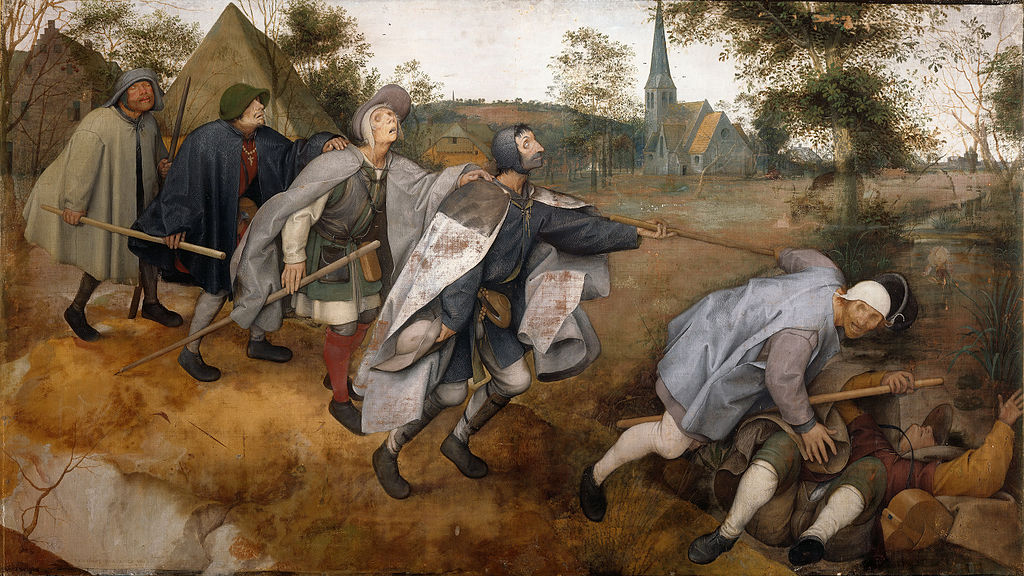I grew up with Calvinist thinking. I spent my time reading Puritans and Spurgeon, checking things in Louis Berkhof, and promoting the books of John Piper. I was fully immersed! I made Mark Driscoll look like a soft Arminian.
Over the years I’ve questioned everything. Naturally. This is The Grit! And as I have, I’ve noticed some structural problems in my faith, some tensions, ways that it didn’t all hang together. I now hold my Calvinist heritage in a slightly more nuanced way. I’m thankful for the truth in it, but willing to acknowledge its weaknesses and critique it also.
I think some of the weakness in Calvinism occurs at a deep structural level. After a decade of thinking this over, I’m ready to sum it up. Here’s my critique:
Calvinism starts with the complete sovereignty of God. Whereas it should end there.
By starting where it should end, it collapses the space in which the story might unfold. It has an anti-narrative bent, a static tendency, built-in. There is no deep significance to time in the Calvinist worldview. Whatever time it is, at the deepest level all is well, for every molecule is following the predetermined will of God. And so all times are fundamentally the same time.
But we need space for the story. We need time for the story. Because the story is the gospel.
For Calvinists, God’s sovereignty is defined basically apart from the resurrection of Jesus. Whereas in the NT, I take it, that event is the defining moment for what it means that God is king. When Calvinists say, ‘Jesus Christ is Lord’, they don’t intend to be saying anything much about God’s sovereignty: that’s already been established long ago. Whereas for the apostles, ‘Jesus is Lord’ was pretty much all they had to say about God’s sovereignty.
For Calvinists, the resurrection of Jesus doesn’t really change much. There is no room for a real coronation, and real victory of God at the cross. Because God’s victory has always been total anyway. He was King the day before, just as he is the day after. The main thing that changes is the appearance of the thing to us down here. But the underlying, unseen relationship between God and the world (i.e. complete sovereignty/submission to his will) remains the same.
In other words, God is not personally implicated or involved in the changes and events that make up the story, because there can be no real event for that sort of God. He is immutable in his utter sovereignty. Try making a story with a leading character like that!
This key aspect of the Calvinist world view, it seems to me, is ultimately anti-gospel.
I have another way I want to express my critique of the Calvinist thought-tradition I belong to. It’s another angle on the same thing:
Calvinism divorces God’s sovereignty from God’s kingdom.
These are metaphors. We can understand something about God by saying he is like one of our human rulers. He is King. He is in charge. He has a territory over which he holds sway. This is his sovereignty.
Or is it his kingdom?
Thing is, the two metaphors are not two, but one. It’s the same image. Therein lies the problem for Calvinism. Let me show you what I mean.
The first mention of God’s sovereignty in Scripture is at the Exodus:
…your right hand, O LORD, shattered the enemy…
You brought your people in and planted them on the mountain of your own possession,
the place, O LORD, that you made your abode,
the sanctuary, O LORD, that your hands have established.
18 The LORD will rule as King forever and ever.” Exodus 15
What does God’s sovereignty mean here? It means he came down and smashed Pharaoh, and created a people and gave them a land where he would rule over them. It’s not abstract, it’s very concrete. It’s about God’s presence and visible action.
In the Psalms, God’s kingship is introduced as a Messianic concept:
He who sits in the heavens laughs;
the LORD has them in derision.
5 Then he will speak to them in his wrath,
and terrify them in his fury, saying,
6 “I have set my king on Zion, my holy hill.” Psalm 2
Another classic ‘kingship psalm’, 29, begins and ends with the image of God hovering over waters:
The LORD sits enthroned over the flood;
the LORD sits enthroned as king forever. Psalm 29
This is a creation image. God asserted his power over the waters, in the creation. They obeyed his voice. In this sense he is viewed as ‘enthroned’ over the waters. This is his kingship, or sovereignty.
Psalm 74 bemoans that in God’s absence, foes have made a mockery of his land. But that is not the whole story: there is still hope of God’s kingship.
Yet God is my King from of old,
working salvation in the earth.
You divided the sea by your might;
you broke the heads of the dragons in the waters. Psalm 74
This is God’s kingship: his victory over the waters and the leviathan. His parting the Red Sea and smashing the ‘dragon’ Egypt. And it may return.
All of these psalms view God’s kingship as something concrete and visible that happens ‘down here’. We tend to overlay this with a framework of ‘God is already fully king, it just needs revealing‘. This is an abstract structure of thought which I suspect would be meaningless to the psalmists.
Seems to me the Jewish Scriptures have a view of God’s sovereignty which is pretty close to what we might call, ‘God’s kingdom’.
In the NT, of course, God’s sovereignty (or kingdom) is completely bound up with Jesus. Revelation 15 is typical: there the first mention of God’s sovereignty in Scripture, from Exodus 15, is transformed:
And they sing the song of Moses, the servant of God, and the song of the Lamb:
“Great and amazing are your deeds,
Lord God the Almighty!
Just and true are your ways,
King of the nations!
Lord, who will not fear
and glorify your name?
For you alone are holy.
All nations will come
and worship before you,
for your judgments have been revealed.”
God can be declared ‘king of the nations’ because of his new victory, which brings all the nations to his feet. Which victory? The victory of the lamb. This is after all ‘the song of the lamb’.
In fact, the NT really has nothing to say about God as sovereign apart from what he has done in making Jesus King. This should give us pause for thought…
This kingdom is of course something that arrives. It means ‘God’s will starting to be done on earth, the way it already is in heaven, as people come under the leadership of Jesus.’ At Jesus’ resurrection and Pentecost, this starts to be a reality.
In Scripture, then there are not two concepts, God’s sovereignty and his kingdom/kingship. They are one and the same.
HOWEVER:
I am aware that systematic theology feels at liberty to use words in a different way from how the Scripture uses them. With its bent towards abstract thought, Calvinist systematics has constructed a whole theology of invisible ‘eternal’ stuff lying behind and prior to God’s action in the gospel, and labelled that concept ‘sovereignty’. Which of course, means ‘kingship’. But it uses this word in quite a different way from how the Scriptures use it.
This is a serious problem for ordinary Christians, as whatever contact they have with Calvinist systematics leads them to misread the Bible’s talk about God’s sovereignty. When they read in the NIV everywhere ‘Sovereign LORD’, they hear it as asserting the Calvinist doctrine of sovereignty. But Adonai Yahweh does not have that meaning. So we have this distortion.
It’s time for the two rival terms and concepts for God’s kingship in the Calvinist tradition to call each other out, confess that they are the same metaphor, go toe to toe and duke it out for the rightful title. This faith ain’t big enough for the two of them.
Historically, ‘sovereignty’ has packed the bigger punch, to the discomfiture of ‘kingdom/kingship’.
But I’m putting my money on ‘kingdom of God’. Coz it’s in the Bible.
Jonathan survived theological college, and now enjoys talking about books, scripture, theology, church, politics, mission, people, stuff like that.
The photo shows, “The Parable of the Blind,” by Pieter Bruegel the Elder, paimted in 1568.

